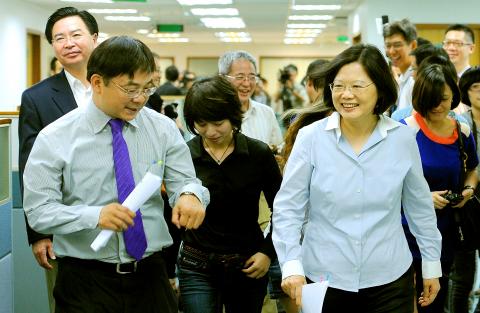It is imperative for the Democratic Progressive Party (DPP) to rebuild its relations with society and facilitate closer engagement with China’s civic movments, academics said yesterday.
The DPP has lost its touch in managing social issues and its relations with Taiwan’s civil society have soured, while at the same time it has never fully understood the emerging civil society in China, former DPP chairperson Tsai Ing-wen (蔡英文) said at the conclusion of a closed-door meeting on the issue, which she chaired.
Rebuilding a constructive partnership between the party and civil society and improving its understanding of social issues would help the DPP find “a new shared idea” between the party and its supporters, Tsai said.

Photo: Liu Hsin-de, Taipei Times
Almost everyone at the meeting agreed that the DPP has a long way to go in terms of its understanding of China.
Collaboration with civil societies across the Taiwan Strait could help change the structure of the bilateral relations altogether, Tsai said in summing up dozens of participants’ comments.
Chinese dissident Wang Dan (王丹), who now teaches in Taiwan, urged the DPP to build contacts with Chinese NGOs, reporters, intellectuals, liberal government officials, business leaders, human rights lawyers and students.
It would be also important for the DPP to distinguish between China and the Chinese Communist Party and the Chinese government as distinct from Chinese society, in its policies, Wang said.
Observing the recent civic movements in Taiwan that have organized large protests, Academia Sinica fellow Wu Jieh-min (吳介民) said there could be three scenarios for future civil movements — being absorbed by political parties, a parallel development and competition with political parties or replacing current political parties.

Japanese footwear brand Onitsuka Tiger today issued a public apology and said it has suspended an employee amid allegations that the staff member discriminated against a Vietnamese customer at its Taipei 101 store. Posting on the social media platform Threads yesterday, a user said that an employee at the store said that “those shoes are very expensive” when her friend, who is a migrant worker from Vietnam, asked for assistance. The employee then ignored her until she asked again, to which she replied: "We don't have a size 37." The post had amassed nearly 26,000 likes and 916 comments as of this

US President Donald Trump said "it’s up to" Chinese President Xi Jinping (習近平) what China does on Taiwan, but that he would be "very unhappy" with a change in the "status quo," the New York Times said in an interview published yesterday. Xi "considers it to be a part of China, and that’s up to him what he’s going to be doing," Trump told the newspaper on Wednesday. "But I’ve expressed to him that I would be very unhappy if he did that, and I don’t think he’ll do that," he added. "I hope he doesn’t do that." Trump made the comments in

Tourism in Kenting fell to a historic low for the second consecutive year last year, impacting hotels and other local businesses that rely on a steady stream of domestic tourists, the latest data showed. A total of 2.139 million tourists visited Kenting last year, down slightly from 2.14 million in 2024, the data showed. The number of tourists who visited the national park on the Hengchun Peninsula peaked in 2015 at 8.37 million people. That number has been below 2.2 million for two years, although there was a spike in October last year due to multiple long weekends. The occupancy rate for hotels

A cold surge advisory was today issued for 18 cities and counties across Taiwan, with temperatures of below 10°C forecast during the day and into tonight, the Central Weather Administration (CWA) said. New Taipei City, Taipei, Taoyuan and Hsinchu, Miaoli and Yilan counties are expected to experience sustained temperatures of 10°C or lower, the CWA said. Temperatures are likely to temporarily drop below 10°C in most other areas, except Taitung, Pingtung, Penghu and Lienchiang (Matsu) counties, CWA data showed. The cold weather is being caused by a strong continental cold air mass, combined with radiative cooling, a process in which heat escapes from